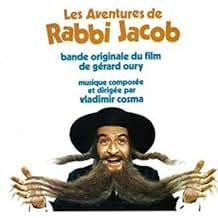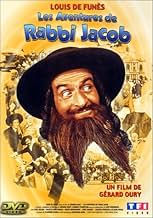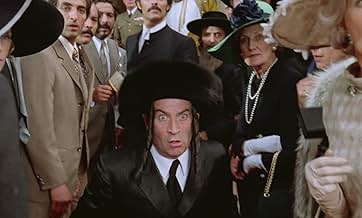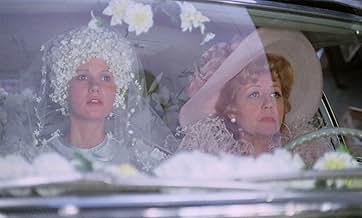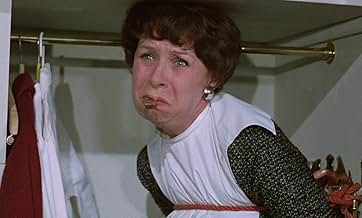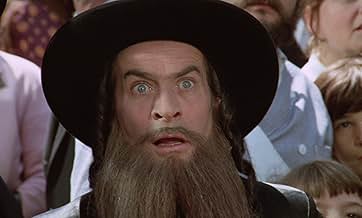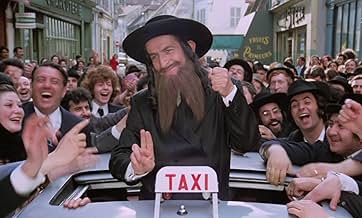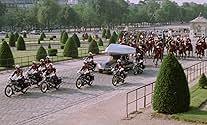IMDb रेटिंग
7.4/10
16 हज़ार
आपकी रेटिंग
अपनी भाषा में प्लॉट जोड़ेंA bigoted Frenchman finds himself forced to impersonate a popular rabbi while on the run from a group of assassins - and the police.A bigoted Frenchman finds himself forced to impersonate a popular rabbi while on the run from a group of assassins - and the police.A bigoted Frenchman finds himself forced to impersonate a popular rabbi while on the run from a group of assassins - and the police.
- निर्देशक
- लेखक
- स्टार
- पुरस्कार
- कुल 1 नामांकन
Marcel Dalio
- Rabbi Jacob
- (as Dalio)
Popeck
- Moishe Schmoll
- (as Jean Herbert)
Paul Bisciglia
- Le pompiste
- (as Paolo Bisciglia)
फ़ीचर्ड समीक्षाएं
In USA, Rabbi Jacob (Marcel Dalio) and Rabbi Zeiligman are traveling back to Paris after a long absence far from his hometown. Meanwhile the bigoted French Victor Pivert (Louis de Funès), who is the owner of a factory, is traveling by car with his Jewish driver Salomon (Henri Guybet) to France to the marriage of his daughter Antoinette Pivert (Miou-Miou). They have a car accident and Pivert fires Salomon and walks on the road looking for help. He stumbles with the Muslin rebel leader Mohamed Larbi Slimane (Claude Giraud) and unintentionally saves the Slimane from assassins that want to kill him.
Slimane abducts him and they head to the Paris airport, chased by the killers and the police. They meet with Rabbis Jacob and Zeiligman that have just arrived in France in the toilet and they impersonate them to escape from the pursuers. When they meet the Jewish community that is welcoming Rabbi Jacob in the airport, they have to proceed in the farce getting in more confusion.
"Les Aventures de Rabbi Jacob" is one of the funniest comedies of cinema history, with a complex screenplay entwining the lives of several characters without coincidences but hilarious situations. The story makes fun of polemic themes, like religion and prejudice, and with government economical interests, but is never disrespectful.
Louis de Funès is fantastic with a top-notch performance, considered by fans of the French king of the comedy as his best ever. Unfortunately the studios do not make movies like this anymore. My vote is nine.
Title (Brazil); "As Loucas Aventuras de Rabbi Jacob" ("The Crazy Adventures of Rabbi Jacob")
Slimane abducts him and they head to the Paris airport, chased by the killers and the police. They meet with Rabbis Jacob and Zeiligman that have just arrived in France in the toilet and they impersonate them to escape from the pursuers. When they meet the Jewish community that is welcoming Rabbi Jacob in the airport, they have to proceed in the farce getting in more confusion.
"Les Aventures de Rabbi Jacob" is one of the funniest comedies of cinema history, with a complex screenplay entwining the lives of several characters without coincidences but hilarious situations. The story makes fun of polemic themes, like religion and prejudice, and with government economical interests, but is never disrespectful.
Louis de Funès is fantastic with a top-notch performance, considered by fans of the French king of the comedy as his best ever. Unfortunately the studios do not make movies like this anymore. My vote is nine.
Title (Brazil); "As Loucas Aventuras de Rabbi Jacob" ("The Crazy Adventures of Rabbi Jacob")
A really funny movie, in my opinion the best of Louis de Funès' movies. For everyone who hasn't seen him yet: You're really missing out on a treat. But watch it in french (with subtitles if necessary) because it is so much better in the original!!!!!
Louis de Funès was the comedian of the french television and is still extremely popular there as in many other countries like Belgium or Germany (in Germany at least a bit) I can recommend every movie he has made, but this one is still my favourite!!
Louis de Funès was the comedian of the french television and is still extremely popular there as in many other countries like Belgium or Germany (in Germany at least a bit) I can recommend every movie he has made, but this one is still my favourite!!
This is one of the best comedies in the French cinema. Louis de Funes plays the role of Victor Pivert, an industrialist with a Napoleonic complex and a tendency for racist viewpoints, who inadvertantly teams up with, Mohamed Larbi Slimane, an exiled Arab political oposition candidate who is on the run from hired assassins in Paris. Pivert and Slimane masquerade as two Jewish rabbis in order to save their lives. What follows are hillarious scenes taking place in the Jewish section of Paris as well as in the surrounding areas. Watch out for the incredible mime scenes by Louis de Funes at the gas station and in the Orly airport.
Give Louis de Funes a good role and the freedom to go nuts, and you will have a good movie. In Rabbi Jacob, Funes is the owner of an industrial plant who "knows that the people like to be lied to" ("mais il AIME qu'on lui mente, le peuple!"). His character is intolerant of Arabs, Jews, Blacks, etc. At one point during the story, however, he must take on the identity of a Rabbi and try to pass himself off as Jewish in order to save his hide. With him is an Arab, who must do the same. If you've seen de Funes before, I'm sure you can imagine the hilarious scenes that arise out of this predicament.
My grandfather, as well as my father were both of them fans of french cinema. I grew up watching this film in our Beta video (oh yes, way before VHS existed and DVD wasn't even thought of) and now, 20 years later I see it again in an anniversary edition. I can say I remember almost every gag from the film... every scene. I just watched it on DVD with my father again and was a blast from the past for both of us, he had seen it with my granddad 35 years ago in the cinema and with me and my brothers several times on video. I am saving this film to watch with my kids too in the future, they'll grow up with it too.
Such a great time...and so many memories
Such a great time...and so many memories
क्या आपको पता है
- ट्रिवियाThe movie was released on October 18th 1973, during Yom Kippur War between Israel and Arab countries. That very day, Danielle Cravenne, wife of the film's publicist Georges Cravenne hijacked an Air France Boeing 727 to prevent the movie from being released, claiming that the movie was pro-Israeli. She boarded the plane at Orly airport in Paris and smuggled a 22 caliber carbine and a toy gun, and demanded that the plane (originally intended to land in Nice) be diverted to Cairo. The pilots convinced her to land in Marseille for refueling and upon landing she allowed the 110 passengers to leave the aircraft, keeping only the pilot and a crew member as hostages. After three hours of negotiations with the authorities, Cravenne asked for food to be delivered. Three members of the police's special forces team boarded the plane disguised as food servers and shot her in the head and chest. She died of her wounds on the way to the hospital.
- गूफ़Fares and his thugs are not really speaking Arabic but mumbling something instead.
- भाव
Mohamed Larbi Slimane: The revolution is like a bicycle, when it stops it falls.
- इसके अलावा अन्य वर्जनIn the english dubbed version, the last line is changed From, "That's alright sir, we'll take you anyway" to "That's alright sir, nobody's Perfect". Then in the ending credits, they thank Billy Wilder for the last line, which is a steal from the last line from "Some Like It Hot".
- कनेक्शनFeatured in Louis de Funès ou Le pouvoir de faire rire (2003)
टॉप पसंद
रेटिंग देने के लिए साइन-इन करें और वैयक्तिकृत सुझावों के लिए वॉचलिस्ट करें
- How long is The Mad Adventures of Rabbi Jacob?Alexa द्वारा संचालित
विवरण
- रिलीज़ की तारीख़
- कंट्री ऑफ़ ओरिजिन
- भाषाएं
- इस रूप में भी जाना जाता है
- The Mad Adventures of Rabbi Jacob
- फ़िल्माने की जगहें
- Saint-Denis, Seine-Saint-Denis, फ़्रांस(scenes set in Rue des Rosiers, Paris 4)
- उत्पादन कंपनियां
- IMDbPro पर और कंपनी क्रेडिट देखें
बॉक्स ऑफ़िस
- बजट
- FRF 1,80,00,000(अनुमानित)
- चलने की अवधि
- 1 घं 40 मि(100 min)
- ध्वनि मिश्रण
- पक्ष अनुपात
- 1.66 : 1
इस पेज में योगदान दें
किसी बदलाव का सुझाव दें या अनुपलब्ध कॉन्टेंट जोड़ें

![Bande-annonce [OV] देखें](https://m.media-amazon.com/images/M/MV5BMDVlMzA2M2EtNTk5Ni00ZTQwLWJiNzctY2Y5YzIwYmFjYzJlXkEyXkFqcGdeQXRyYW5zY29kZS13b3JrZmxvdw@@._V1_QL75_UX500_CR0)

